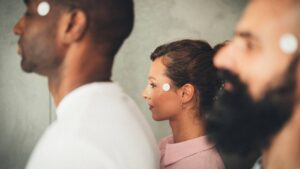Digital prescription: ASX stocks transforming healthcare sector

Pic: Getty Images
- DHCRC believes there is an opportunity to transform Australia’s healthcare sector through digital innovations
- Alcidion helps health organisations harnesses the power of technology to empower digitally enabled care
- Bailador has long recognised potential of digital healthcare and invested more than $77m in four companies in the space
Digital innovations have the potential to transform digital healthcare increasing efficiencies and according to the Productivity Commission’s Leveraging digital technology in healthcare research paper, potentially saving $5.5bn annually off the health budget.
Digital Health Cooperative Research Centre (DHCRC) CEO Annette Schmiede told Stockhead during covid Australia saw more than a decade worth of innovation occur across the healthcare sector in less than two years.
“There is now a unique opportunity to double down on that innovation and deliver more personalised, connected and effective care for all Australians,” she said.
“We have a once in a generation opportunity to take advantage of this attention, to transform the delivery of healthcare, and to improve patient experiences.
“We plan to help drive this forward every step of the way.”
Schmiede said digital health covered the broad scope of tools and technologies used to diagnose and treat patients along with collecting and sharing patient health information.
She said telehealth services, electronic medical records, wearable devices and artificial intelligence were all examples of how digital was being used to provide more affordable, convenient, and accessible care.
On the ASX there are several companies involved in digital healthcare innovation. Here’s some we’ve noticed:
Alcidion (ASX:ALC)
ALC helps healthcare organisations harness the power of technology to empower digitally enabled care.
The company provides platforms to health organisations across Australia, NZ and the UK that leverage clinical decision support, artificial intelligence and real-time data interoperability and visualisation to provide smart health informatics enabling more efficient and safer delivery of care.
CEO Kate Quirke told Stockhead in practice, there’s very little by way of application of smart technology in clinical healthcare delivery to support process automation.
“Compared to other sectors, healthcare is really quite immature when it comes to using data to support practice improvement,” she said.
Quirke said data interoperability remained a long-term challenge. She said differing federal versus state healthcare responsibilities, and the accompanying conflicting “rail gauges” this created, also made it challenging, especially for the private sector.
“What we need are centrally mandated interoperability standards that all providers need to adhere to, rather than trying to retrofit or connect together different systems,” she said.
Quirke said AI has enormous potential for healthcare but was still in its infancy and taking into the challenges outlined above the ground work needed to be done first before the full potential presented by these emerging technologies could be harnessed.
“There are of course some exciting things happening now with ambient intelligence assisting with clinical documentation, an area of great burden on our clinicians,” she said.
“We have been working with AI for some time at Alcidion, using it for prediction and across our natural language processing in clinical noting but there are ongoing efforts to ensure the regulatory and ethical considerations are addressed as we advance these capabilities.
“In the meantime, we like to refer to it as augmented intelligence, where we are assisting the clinicians with smarter technology but always in an open and transparent manner.”
The DHCRC is facilitating two projects that are looking to deepen the evidence base for the use of ALC’s technology in practice.
“The first of these projects is with Monash University to evaluate the impact of our Miya Flow electronic journey patient boards in the Alfred Health Network,” Quirke said.
“A second longer term project along with Sydney Local Health District, eHealth NSW, Murrumbidgee LHD, NSW Health, University of Sydney and The Queensland University of Technology is looking to evaluate and improve clinical decision support tools in hospital settings, which is a fairly new area of practice.”
MedAdvisor (ASX:MDR)
Software company MDR provides pharmacy-driven, patient-engagement solutions to solve a big US$600bn big healthcare problem that costs lives – medication adherence.
The company works with more than 33,500 pharmacies in the US to deliver programs to help patients take their medication safely and effectively.
In Australia, MDR has connected more than 3.7 million patients through more than 95% of Australian pharmacies.
MDR was founded in 2012 by software engineer Josh Swinnerton, after watching his mother – a Parkinson’s disease sufferer – trying to manage 10 daily medications.
PDR recently reported a solid Q4 FY24 result, with operating revenue up 32% on pcp to $22.3m with the US up 34.2% to $15.3m and ANZ up 27.3% to $7m.
The company’s full year FY24 results came in with guidance, including revenue of $122.1m, up 24.6% on pcp. FY24 gross profit is up 25.1% on pcp to $74.2m.
Control Bionics (ASX:CBL)
The medical devices company is focused on helping patients with communication challenges due to neurological conditions like Motor Neurone Disease/Amyotrophic Lateral Sclerosis (MND/ALS).
CBL’s core patented NeuroNode technology is a wireless, wearable device detecting minute signals from the brain to skeletal muscles capturing electromyography (EMG) output.
CBL said this output is then sent wirelessly via NeuroNode to a personal computer, which enabled speech and other computer-controlled functions such as email and texting.
NeuroNode was recently approved as a reimbursable medical device in the US under a new coding system by the Centers for Medicare and Medicaid Services (CMS).
CBL recently expanded its offering to include mobility solutions with the launch of DROVE, which has now been approved by the Therapeutic Goods Administration (TGA) in Australia.
The autonomous wheelchair module enables powered wheelchair users to operate their wheelchairs independently in their own homes.
CLB is also currently commercialising its most recent tech advancement the NeuroStrip. The wearable, innovative physiological measurement tool provides the business with the opportunity to enter new markets such as health diagnostics, sports performance and rehabilitation.
Blinklab (ASX:BB1)
BB1’s smartphone and tablet-based app has the potential to become a valuable clinical tool for diagnosing autism and/or ADHD, significantly reducing the time it takes for families and patients to receive a diagnosis.
With its origins at Princeton University, the platform was developed by a team of neuroscientists, medical doctors and software engineers.
The platform uses advanced smartphone sensors to measure subtle changes in sensory responses, focusing on the brain’s reaction to unexpected sounds.
The approach leverages the known phenomenon that individuals with ADHD and autism often exhibit different responses to unexpected sounds, such as blinking more frequently or differently compared to neurotypical individuals.
CEO Henk-Jan Boele (MD PhD) said the platform could be a “game changer” in the field of neurometrics and diagnostic testing for conditions such as autism and ADHD.
Boele, who holds a medical degree and is a successful neuroscientist at Princeton University and Erasmus MC, said one of the challenges in diagnosing autism and ADHD was the absence of definitive medical tests.
He said diagnostic evaluations rely on subjective observations from clinical experts, schools, and families.
Bailador Technology Investments (ASX:BTI)
The tech-focused capital fund has long recognised the potential of digital healthcare and has invested more than $77m in cash in four companies in the space.
Digital healthcare investments currently represents ~25% of BTI’s total investment portfolio value.
BTI’s latest investment was $20m in Updoc in May. Updoc connects consumers who need medical services with registered health practitioners via a telehealth platform.
BTI had previously invested more than $30m in a similar business, InstantScripts, which was a particularly successful investment with the business scaling rapidly and being sold to Australian Pharmaceutical Industries (API), a subsidiary of Wesfarmers (ASX:WES) in June 2023, generating a 61% IRR for BTI.
In December 2021 BTI invested in Access Telehealth and Mosh. Access Telehealth offers in-person and telehealth care to three community groupings in Australia including regional communities, NDIS participants and aged care.
Mosh is a digital healthcare service focused on men’s health across the areas of hair loss, weight management, sexual and mental health.
BTI co-founders David Kirk and Paul Wilson said the rapidly emerging digital healthcare space is benefitting all stakeholders and was thrust into the spotlight during covid lockdowns.
“That experience was a revelation to many people that certain elements of healthcare could be delivered effectively, and in fact more efficiently, by utilising digital technology,” the founders said.
“A number of businesses are developing which allow patients to more efficiently address some routine health matters, while maintaining in-person general practitioner consultations as central to the healthcare ecosystem.
“This is benefitting patients, doctors, and the health care system itself.”
At Stockhead, we tell it like it is. While Blinklab, Control Bionics and Bailador Technology Investments are Stockhead advertisers, the companies did not sponsor this article.
Related Topics

UNLOCK INSIGHTS
Discover the untold stories of emerging ASX stocks.
Daily news and expert analysis, it's free to subscribe.
By proceeding, you confirm you understand that we handle personal information in accordance with our Privacy Policy.








